Any conversation needs specific questions to delve deeper and reveal previously undiscovered information. They enable you to go beyond quick answers, promoting a deeper and more fruitful conversation. Asking follow-up questions may significantly improve the quality of your interactions, whether you're in an interview process, getting feedback, or just having casual conversations.
This article will explain follow-up questions, give 30+ examples for different situations, and provide tips on how to utilize them successfully. Gaining proficiency in the follow-up technique can improve your ability to communicate with others and forge closer relationships.
What is a follow-up question?
A follow-up question is a kind of question used to elicit further details, elucidate an idea, or go deeper into a subject matter following an initial question.
It expands on the preceding response by urging the speaker to give more information or to be more specific. In talks and interviews, follow-up questions are crucial because they reveal new information and verify comprehension.
A follow-up question is intended to get more details, shed light on certain areas, or delve deeper into a topic. Asking follow-up questions shows knowing a subject in its entirety. Learning how to ask follow-up questions effectively will help you have more productive conversations and build stronger relationships with other people.
When to ask follow-up questions
Gaining a more thorough grasp and obtaining deeper insights requires knowing when to ask follow-up questions. You may go further into an answer by asking follow-up questions, which also provide clarification, elaboration, and other information that enhances the discussion. These are scenarios in which you can utilize these questions:
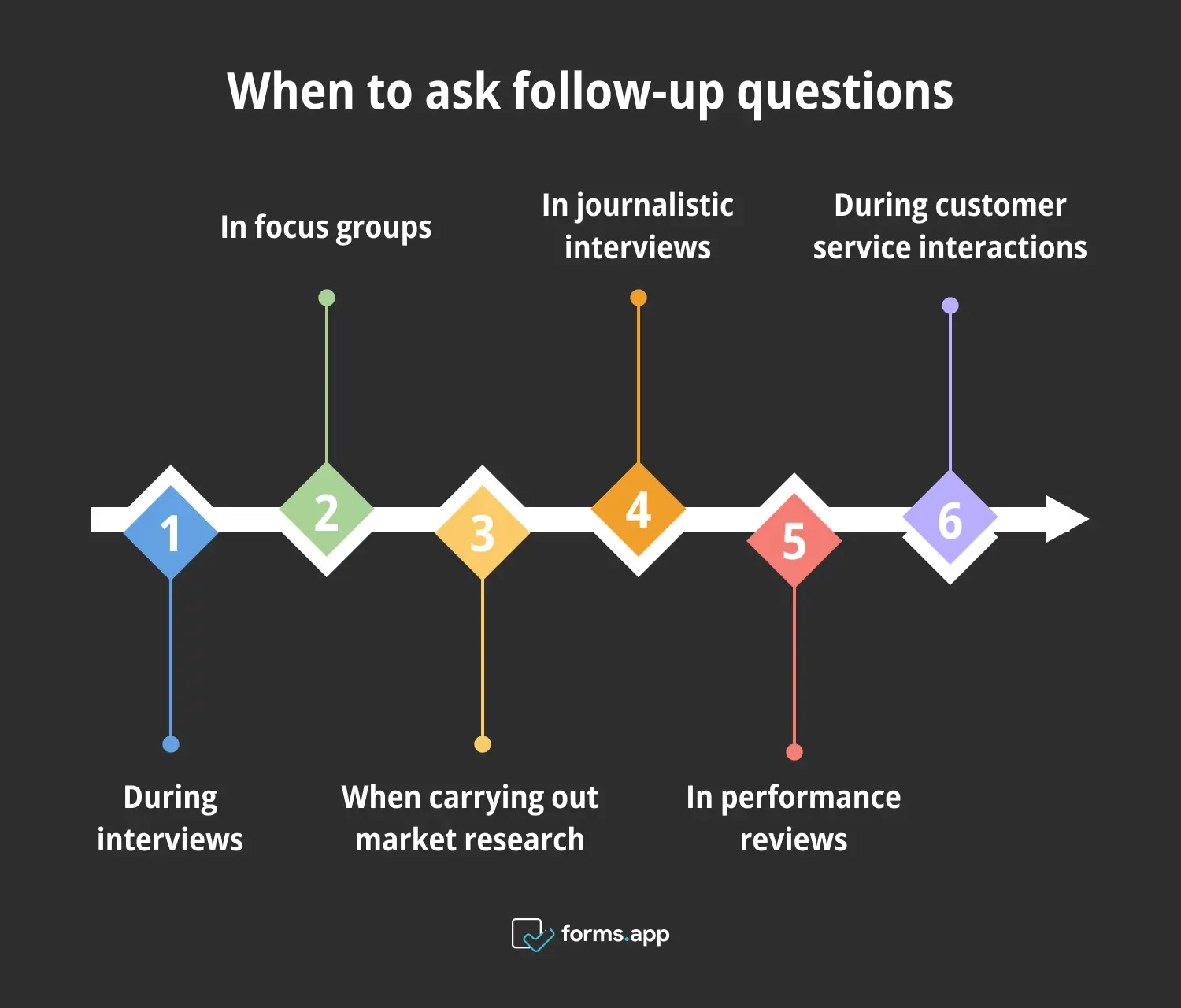
Right times to use follow-up questions
⏰ During interviews: To learn more about a candidate's background, abilities, and mental processes than just what they first said.
⏰ In focus groups: To thoroughly comprehend the group's collective insights by delving into members' thoughts and understanding the reasons behind their viewpoints.
⏰ When carrying out market research: To make respondents' choices and actions more understandable so that consumer patterns and decision-making processes may be better understood.
⏰ In journalistic interviews: To guarantee accuracy and depth in the reporting, gain a more comprehensive account, clarify facts, or encourage the interviewee to expound on important topics.
⏰ In performance reviews: To better understand an employee's accomplishments, difficulties, and areas in need of growth by delving into their opinions and self-evaluations.
⏰ During customer service interactions: To better handle complaints or issues from customers by getting more specific information about their expectations and experiences.
Why to use follow-up questions
Comprehending the significance of good follow-up questions is imperative for proficient communication. These are meant to be deeper-dwelling queries that encourage more clarification and elaboration. You may get more information and insights by probing beyond the first few answers, which will enhance the conversation and result in a deeper comprehension.
We'll go over the many reasons why it's important to use follow-up questions:
✅ Follow-up questions resolve any doubts or misconceptions from the first answer. They provide an opportunity to clarify any ambiguous points and ensure that all relevant details are accurately understood.
✅ They provide a more thorough exploration of the respondent's thoughts, feelings, or experiences. This more thorough investigation enhances our grasp of the respondent's viewpoint overall and aids in revealing underlying motives.
✅ They show curiosity while paying close attention, encouraging the respondent to speak more. Asking follow-up questions demonstrates real questions and invites more candid and in-depth answers.
✅ Follow-up questions elicit details from the respondent that they may not have first disclosed. This can reveal subtleties and other information the first response did not immediately clarify.
✅ By examining the responses for consistency, they search for gaps or discrepancies in the responses. Finding and resolving discrepancies contributes to the accuracy and dependability of the data collected.
✅ These questions force the respondent to think more carefully about their answers. More accurate and introspective responses may result from this careful pondering process.
✅ They modify the conversation to fit the respondent's needs or concerns. Asking questions tailored to certain topics makes information more targeted and helps solve pertinent issues.
✅ Asking follow-up questions helps build rapport by expressing gratitude for the respondent's participation. You may create a more cooperative discourse and strengthen your relationship with them by valuing their opinions.
30+ Essential questions to ask in a follow-up questionnaire
Asking the correct questions is essential to creating a follow-up questionnaire that will yield insightful and useful information. We've put up a list of 30+ follow-up question examples to get you started and make sure your follow-up efforts are successful.
General questions to ask in a follow-up survey
When designing a follow-up survey, asking the right general questions is key to gathering insightful and actionable feedback. These questions help assess overall satisfaction, identify areas for improvement, and understand the respondent's experience in a broader context.
1. How satisfied were you with your overall experience?
2. Would you recommend our services/products to others?
3. Did you feel that your needs were adequately addressed?
4. Is there anything else you would like to share about your experience?
5. Did you find our staff helpful and knowledgeable?
6. Do you have any suggestions for how we can better serve you?
7. What aspects of your experience stood out to you the most?
8. How would you rate the communication you received throughout the process?
9. What motivated you to choose our services/products over others?
- Our value for the money and competitive price
- The quality and dependability of our offerings
- Favorable evaluations and suggestions from other people
- Excellent help and client service
10. Did our product/service provide the value you were expecting?
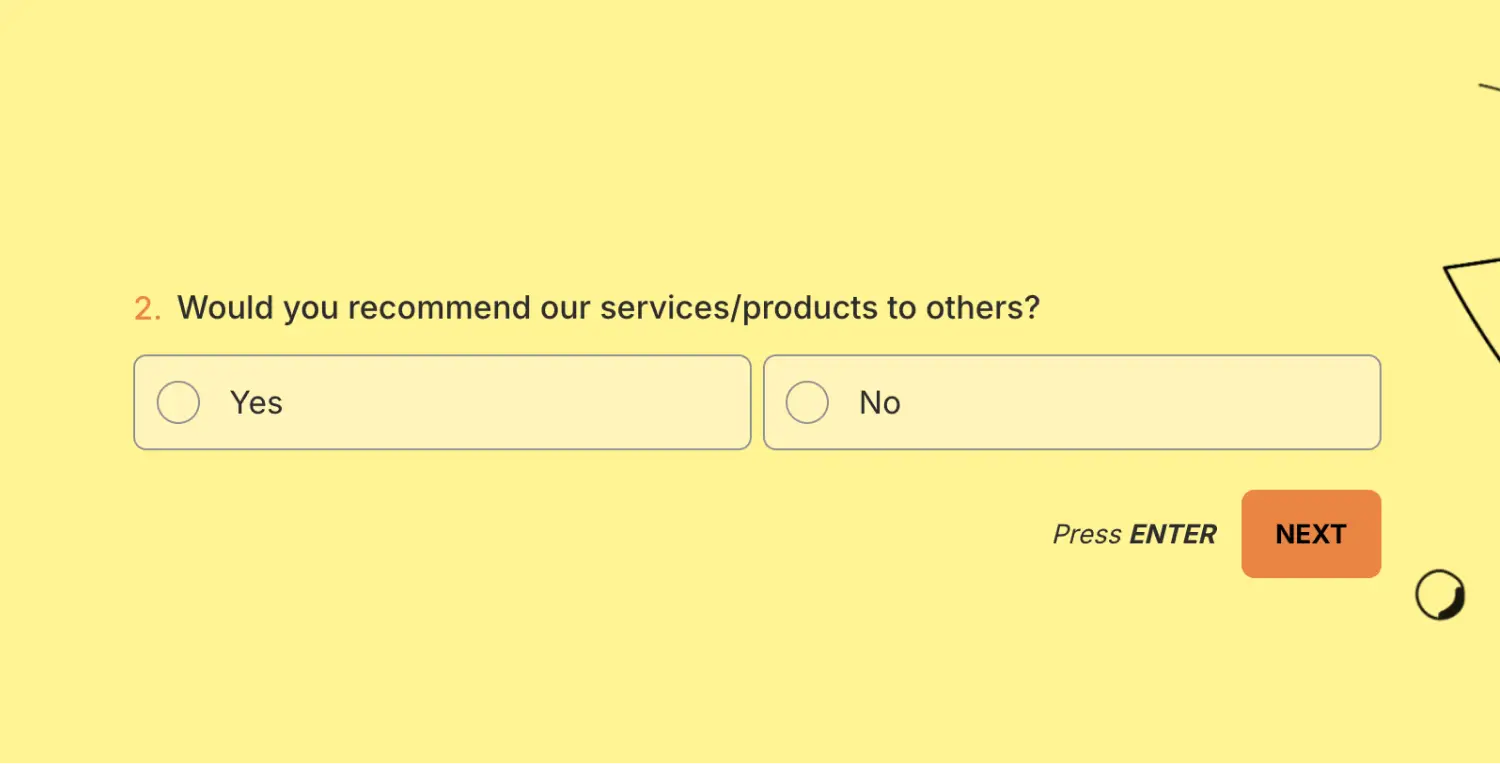
A general follow-up question
Follow-up interview questions for employees
Asking employees follow-up job interview questions is crucial to learning more about their experiences, output, and future goals. These examples of follow-up questions for interviews probe their contributions, difficulties, and development inside the company culture, building on their first answers.
For example, as a hiring manager, you may gain a deeper understanding of an employee's position and pain points by posing focused follow-up questions:
11. How do you respond to criticism from superiors or coworkers?
- To get better at what I do, I actively seek out criticism.
- I pay close attention to what people have to say and change as necessary.
- I clarify expectations with my supervisor by talking about feedback.
- I track my progress and create new goals with the help of comments.
12. How do you stay updated with industry trends?
- I read journals and trade periodicals on a regular basis.
- To keep updated, I read and participate in pertinent blogs and forums.
- I participate in webinars and industry conventions.
- I participate in networks and associations for professionals.
13. How have you contributed to improving processes or efficiency within your team?
14. Could you explain a time when you had to adapt to a significant change at work?
15. What steps do you take to ensure you meet tight deadlines?
16. Could you share an experience where your leadership made a positive impact on your team?
17. What are your long-term career goals?
18. How do you manage your time between work and personal life?
19. What’s one thing you would like to improve in your current role?
20. How do you typically manage stress at work?
- Taking pauses
- Setting work priorities
- Engaging with coworkers
- Putting in more hours at work
21. Which of the following best describes your approach to teamwork?
- Leading the team
- Collaborating equally
- Supporting others
- Working independently
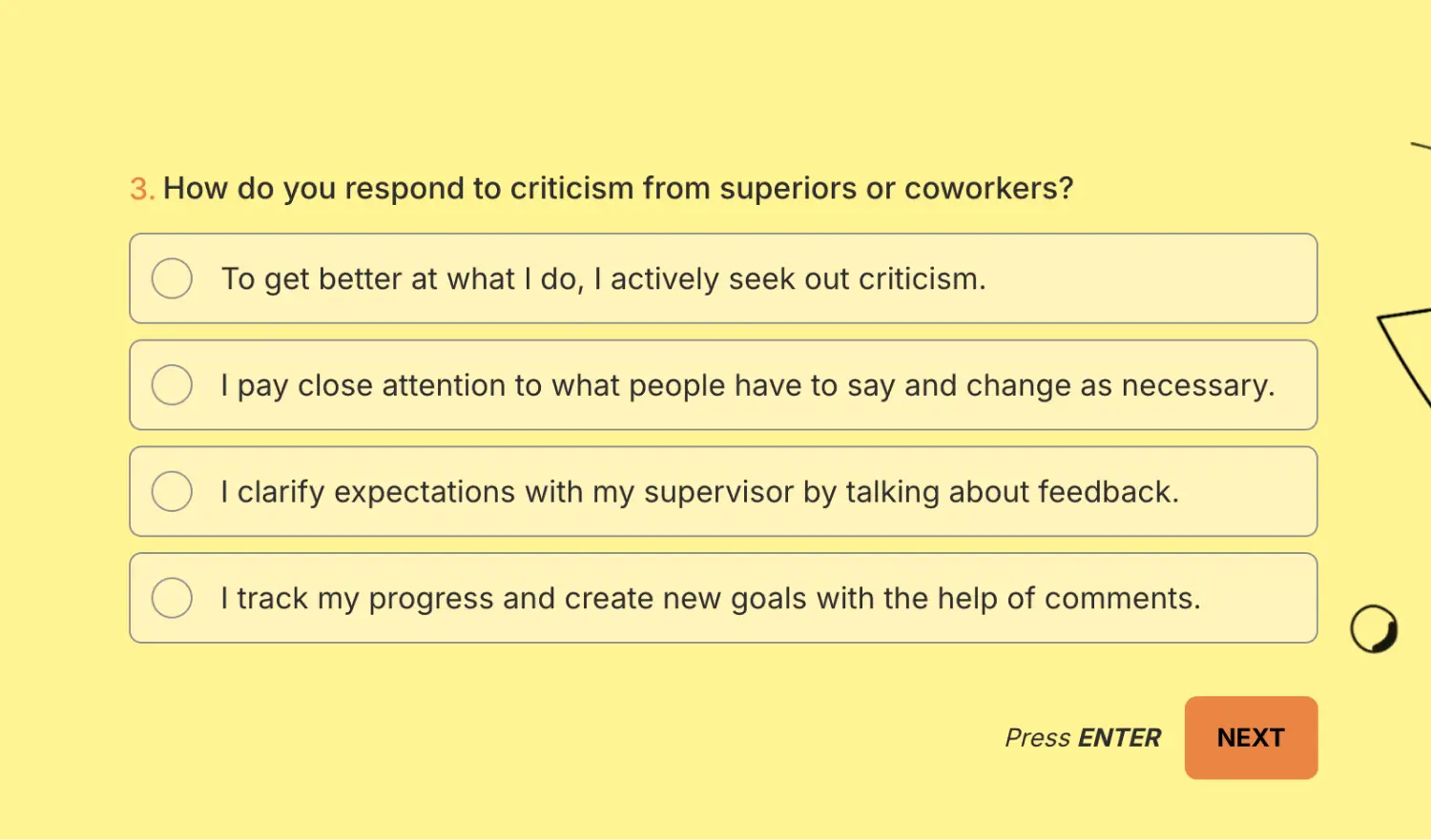
A follow-up question for employees
Follow-up interview questions for candidates
Follow-up interview questions are essential to the recruiting process because they help you learn more about candidates' backgrounds, aspirations, and possible fit with the company. These questions aid in deciphering the candidate's first answers, going deeper into their experiences, and evaluating how well their objectives and skill set match the position.
22. What drives you most in the workplace?
- Reaching predetermined objectives
- Acknowledgment and favorable comments
- Prospects for growth
- Difficult and fascinating projects
23. What is your preferred method for receiving feedback?
- Regular one-on-one meetings
- Written performance reviews
- Informal feedback during team meetings
- Immediate feedback after completing a task
24. What aspects of your career do you want to focus on developing further?
25. How do you plan to familiarize yourself with our company’s processes and culture?
26. What kinds of projects are you particularly interested in working on?
27. How would you approach integrating with existing teams?
28. What is your preferred method for managing multiple projects?
- Creating detailed to-do lists
- Using project management software
- Prioritizing tasks by deadlines
- Regular check-ins with a supervisor
29. What kind of feedback or support will help you reach your future goals?
30. How do you handle tasks or projects outside your comfort zone?
31. What specific aspects of this job appeal to you the most?
32. What was the most important lesson you learned from your last job?
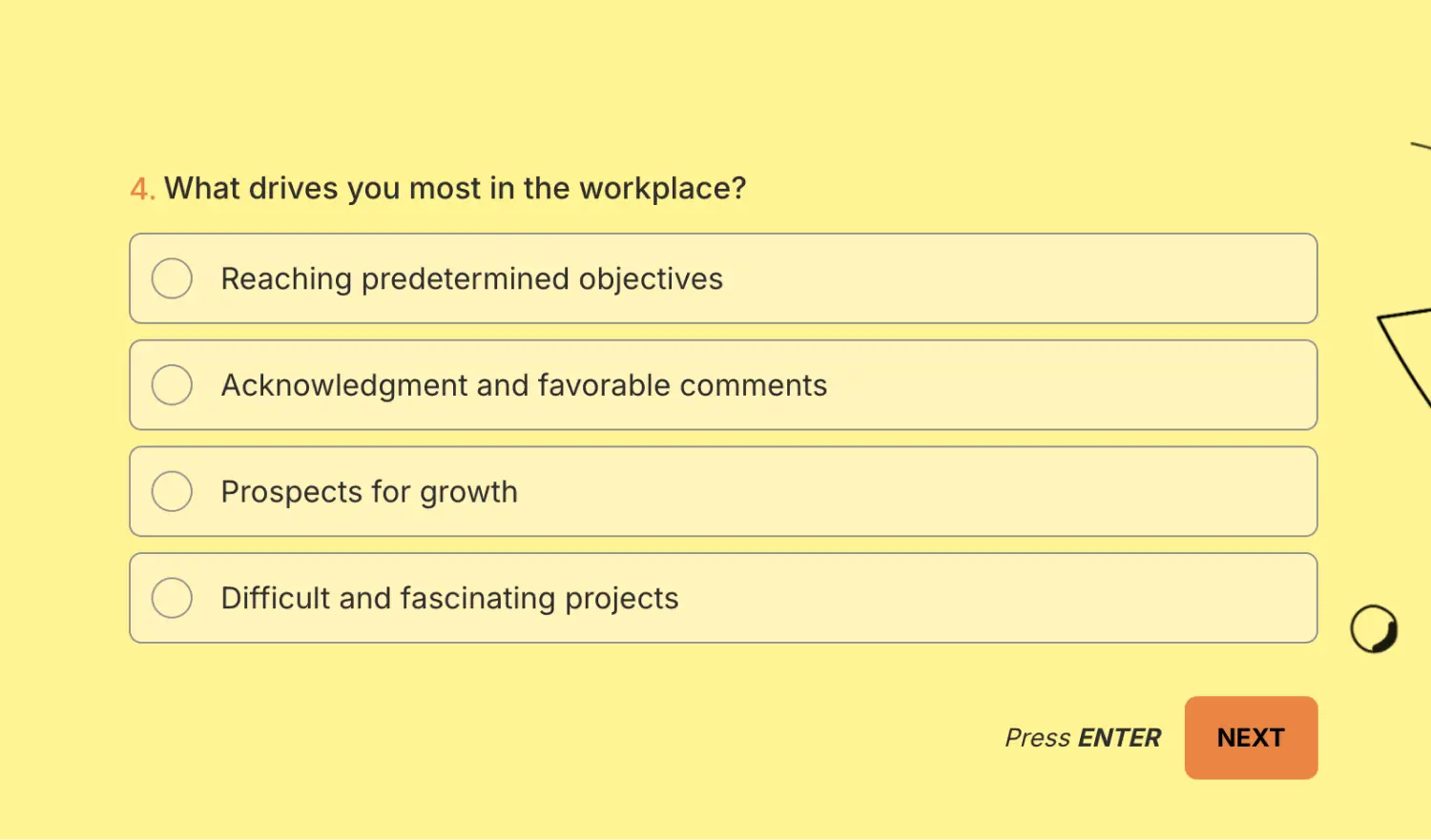
A follow-up question for interviewees
How to create a follow-up survey in 6 steps?
Using a platform like forms.app, creating a follow-up survey is easy. You can create and distribute surveys with ease using our user-friendly tool, which enables you to get insightful and useful feedback. This is a detailed tutorial on using forms.app to create your follow-up survey:
1. Register or sign in
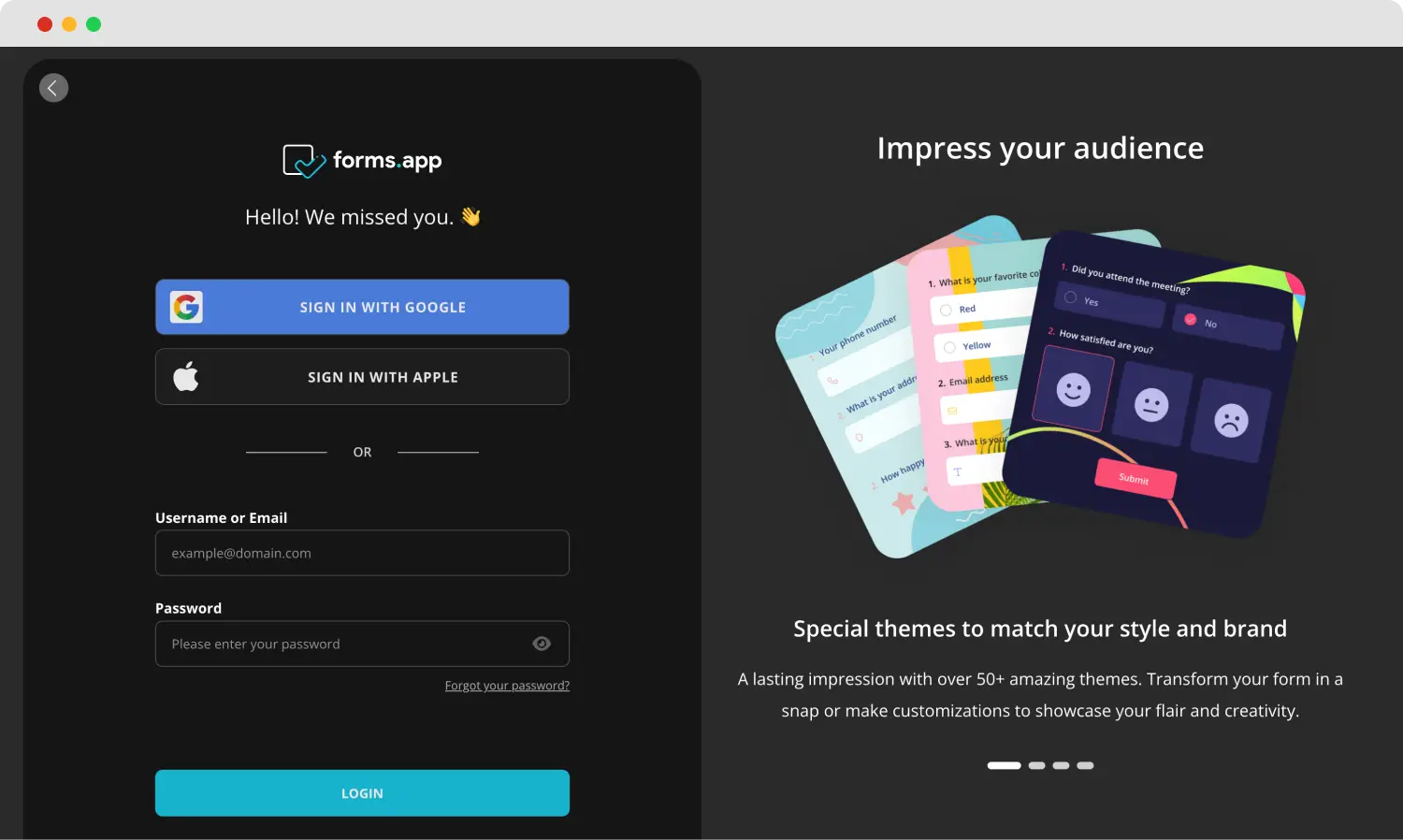
Sign in your forms.app account
Start by registering for a new account or signing into an already-existing one.
2. Create a new form: To begin a new survey, click the “Create Form” button. Use the AI capability of forms.app to swiftly create a survey template that meets your demands. This tool makes the survey design process more efficient.
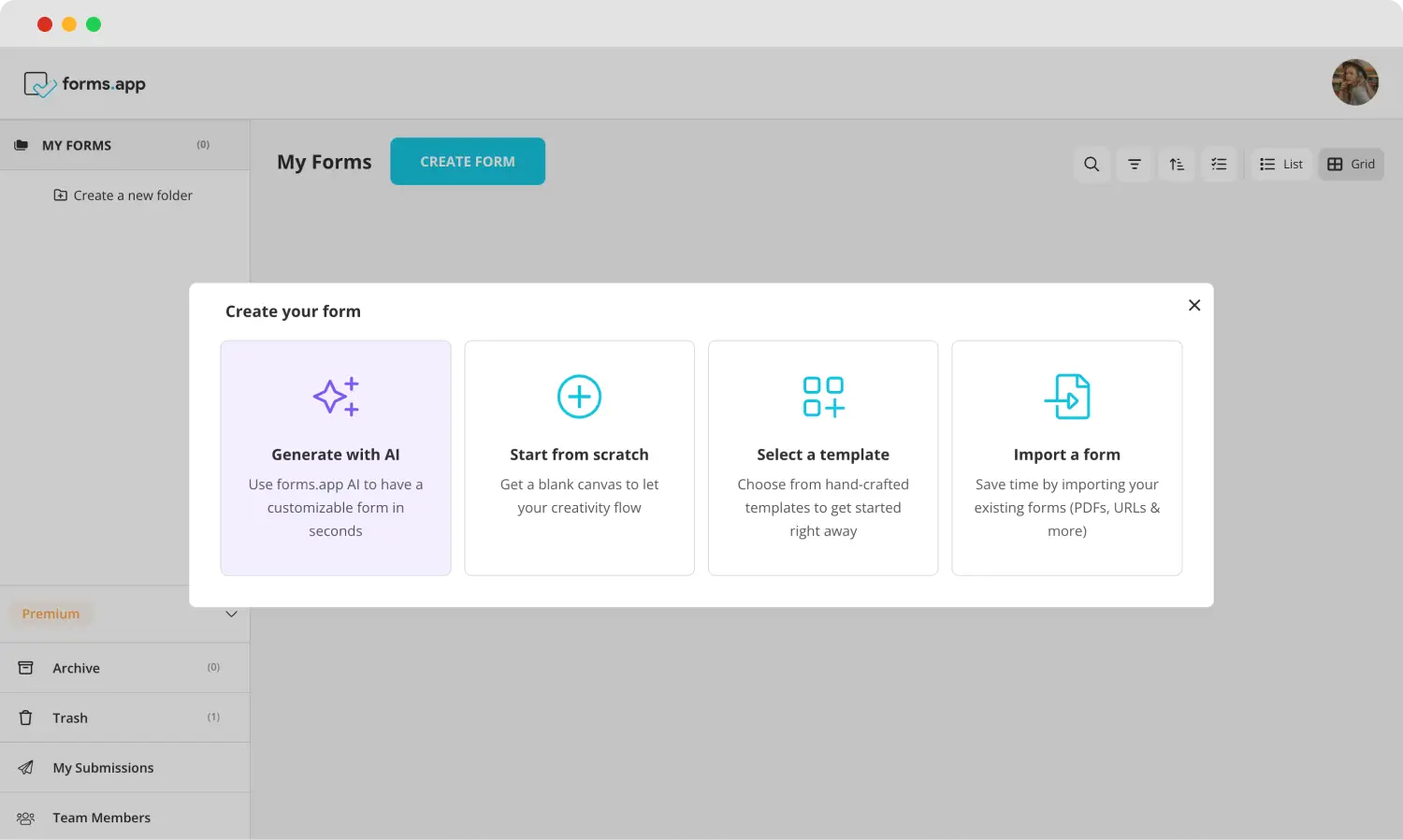
Choose a beginning option
3. Select a template: Use a pre-made follow-up survey template or begin with a blank form.
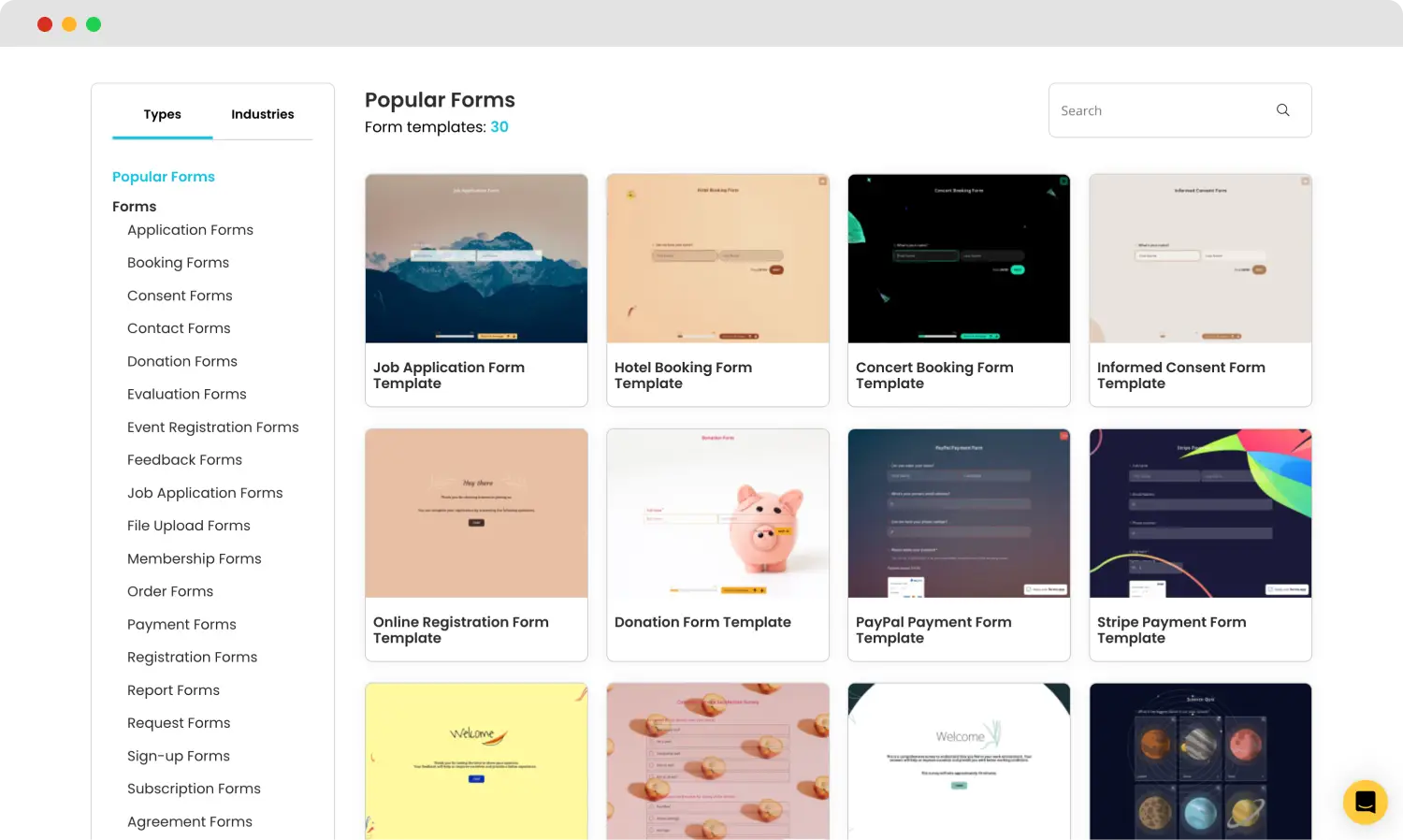
Choose a template
4. Add questions: You may add several kinds of questions, such as multiple-choice, rating scales, and open-ended questions, by using the drag-and-drop tool.
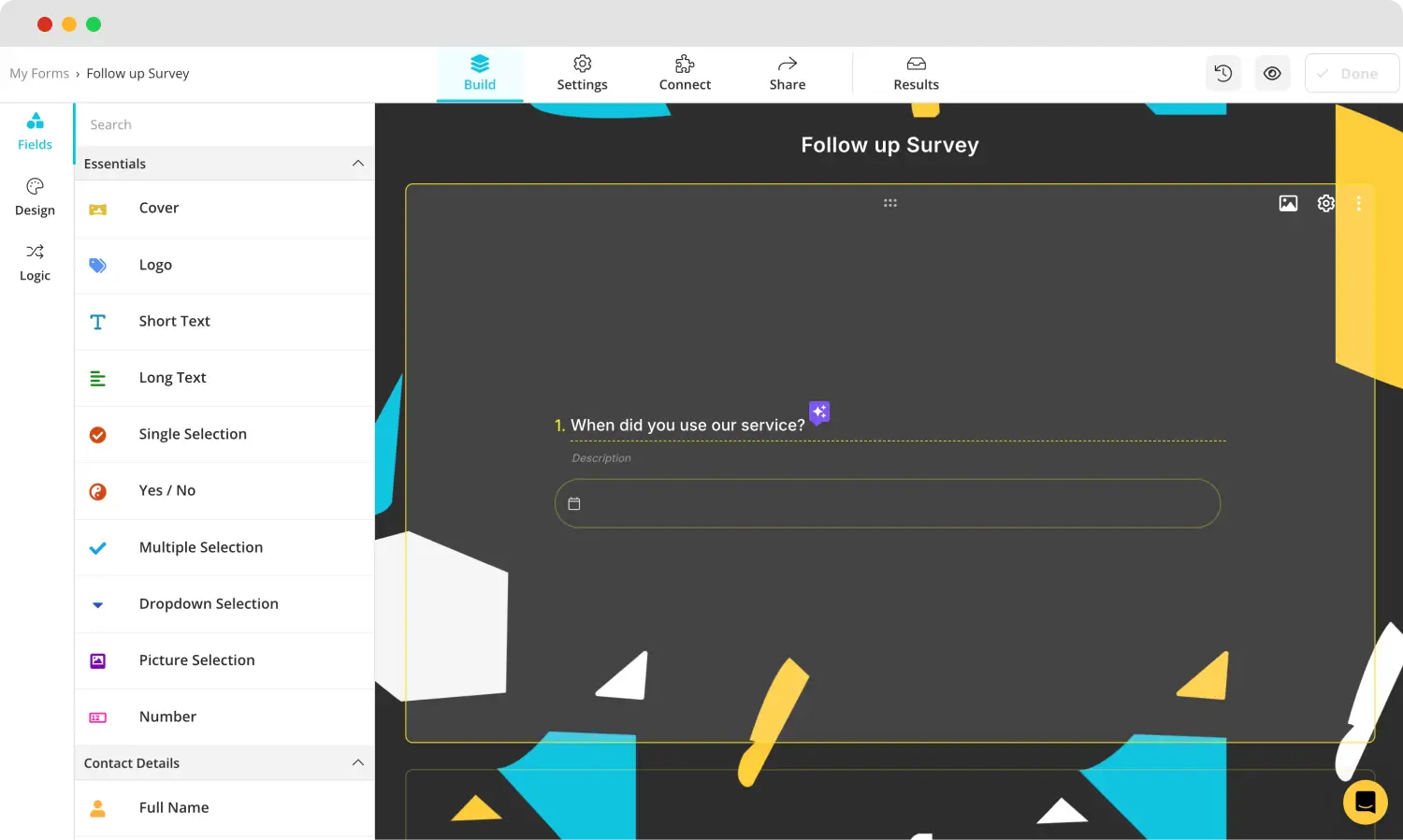
Add your follow-up questions
5. Share the survey: To make sure it reaches your target audience, send out the survey link via email or post it.
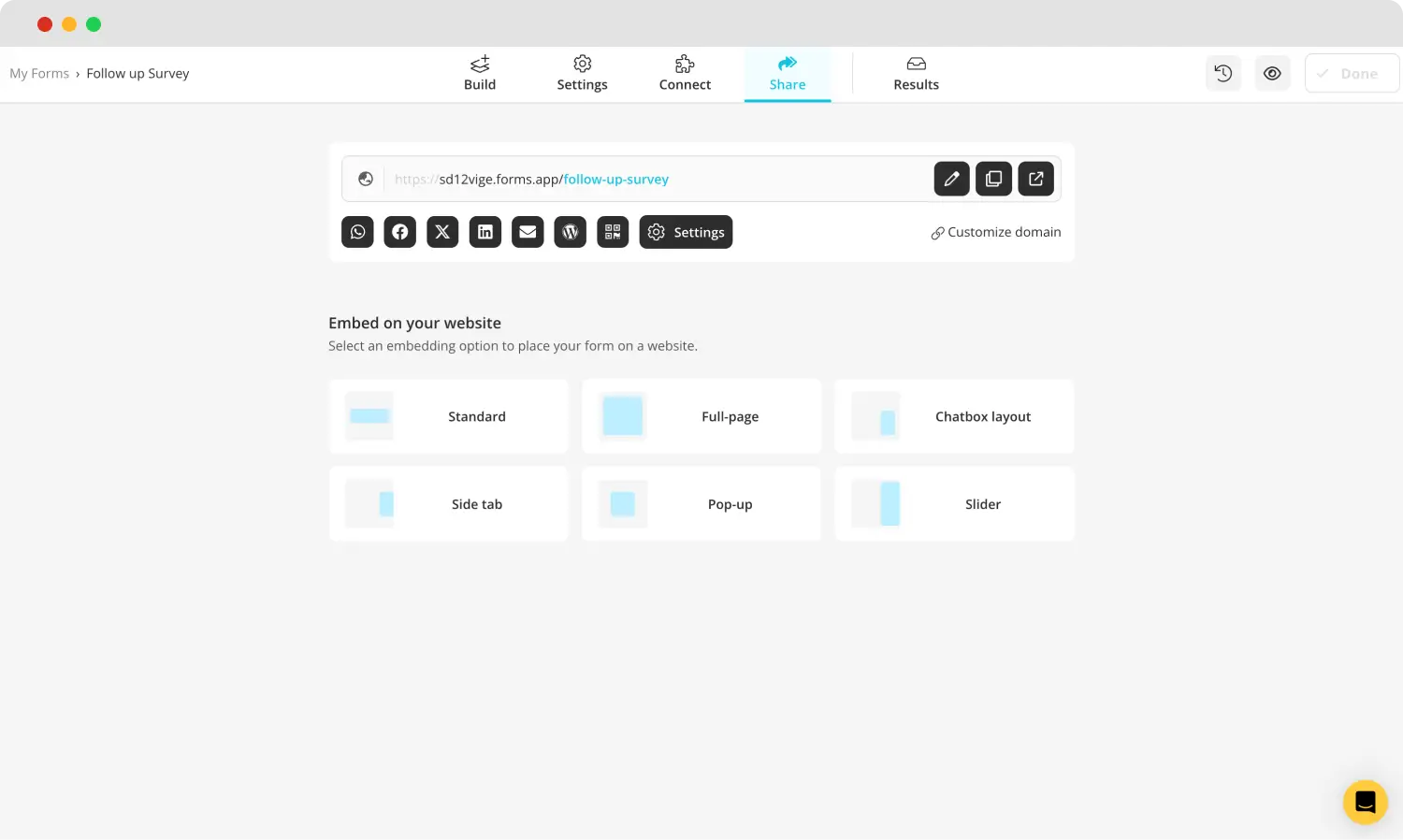
Share your form
6. Analyze the results: After gathering answers, you can use the integrated statistics function of forms.app. It will be simpler to extract insights from your follow-up survey with the help of this feature, which lets you track answers in real time, analyze the data with charts and graphs, and create automatic reports.
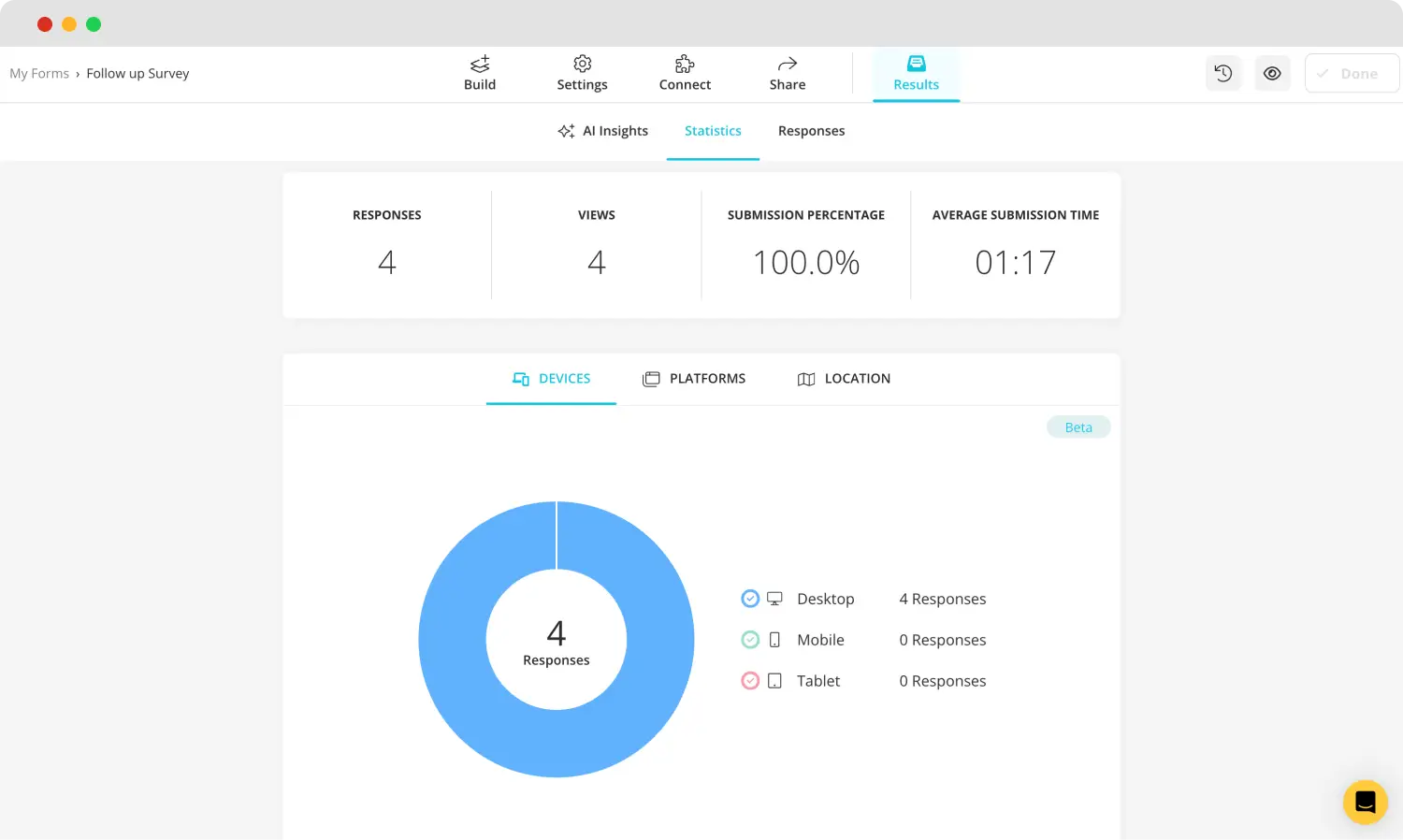
Check the results
Wrapping it up
Asking follow-up questions is essential to building rapport and demonstrating your appreciation for the respondent's viewpoints. Focusing the discussion on significant topics and goals enhances comprehension and retention by encouraging critical thinking and in-depth concept exploration. Learning how to ask follow-up questions well can improve your ability to communicate and strengthen relationships.
Follow-up questions can spark critical thinking and result in deeper conversations by directing the conversation toward pertinent concerns and objectives. Developing the talent for follow-up questions may revolutionize your ability to communicate, revealing insightful information and fortifying relationships in both personal and professional contexts.
Discover the ability of follow-up questions to improve dialogue and produce significant results!
forms.app, your free form builder
- Unlimited views
- Unlimited questions
- Unlimited notifications
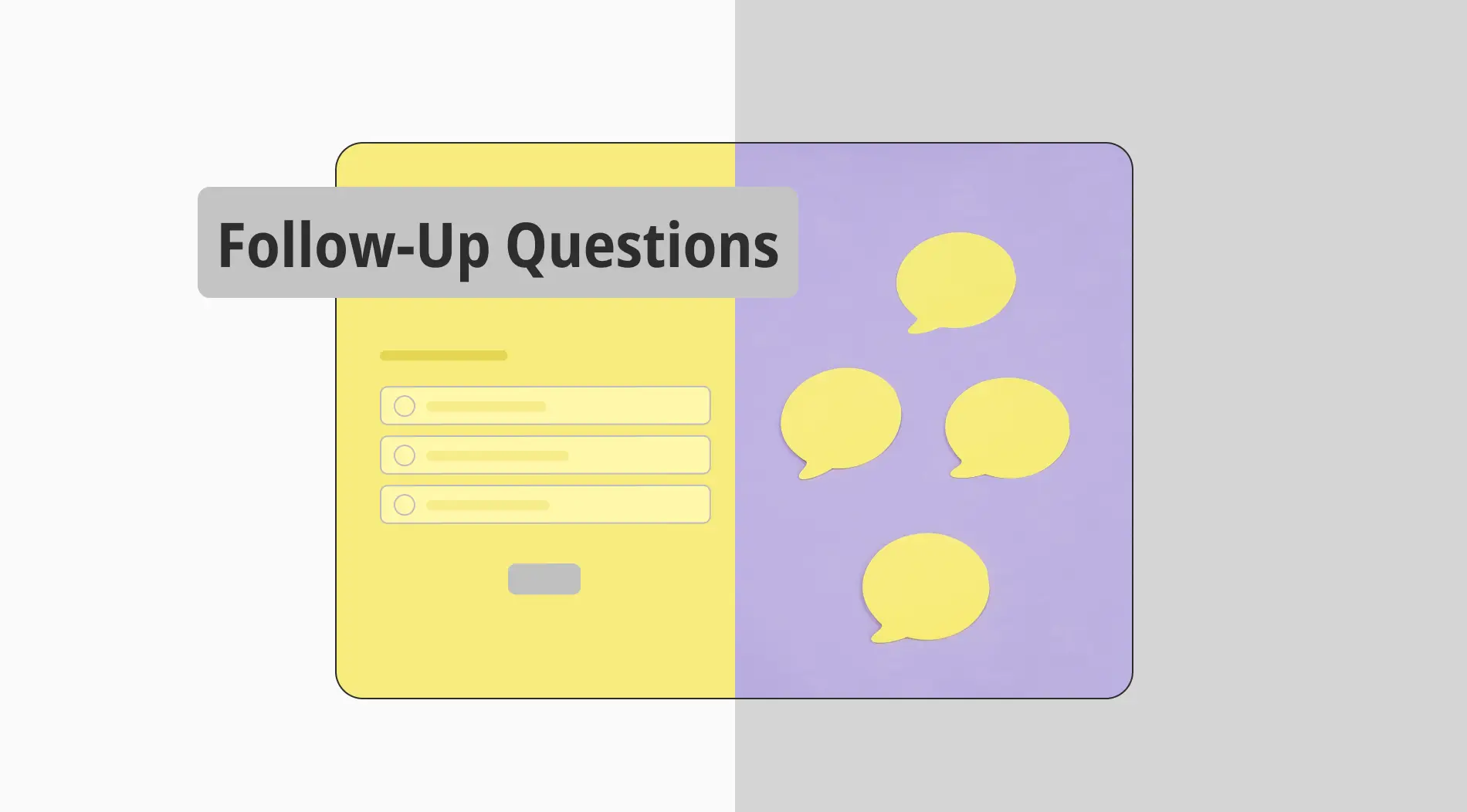
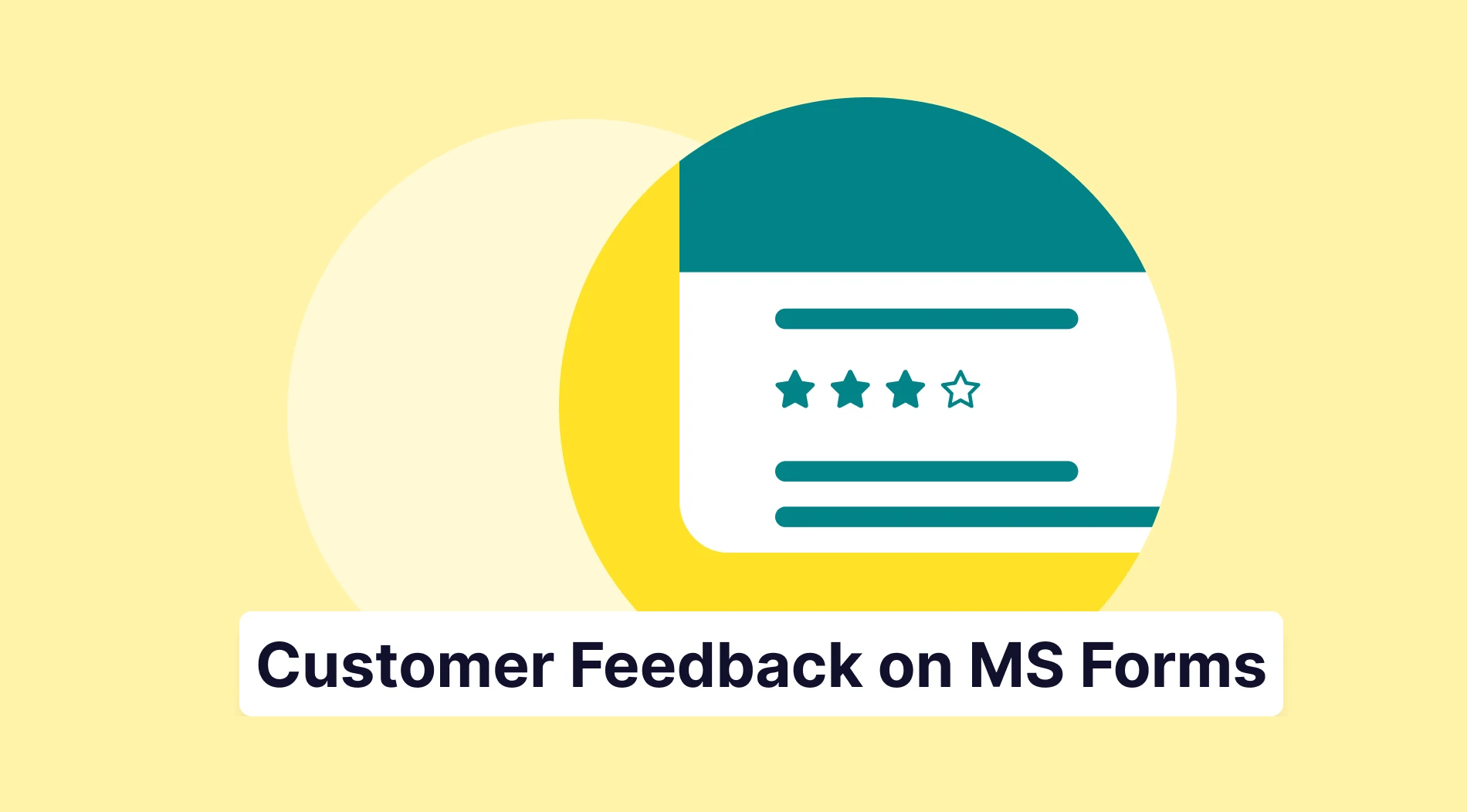
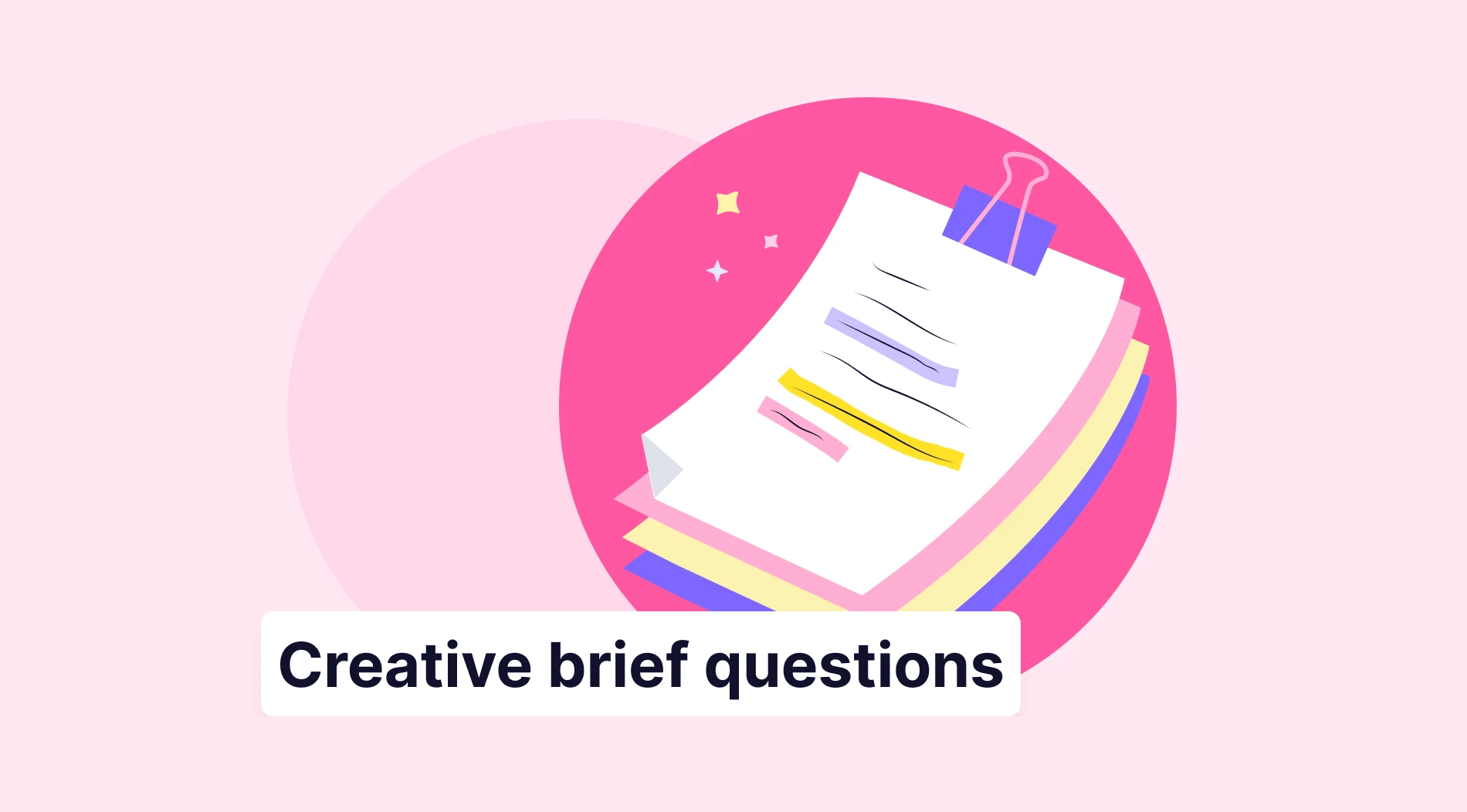
![150+ Fun poll questions for any event [2026 edition]](https://file.forms.app/sitefile/100_fun_multiple_choice_poll_questions_1.webp)